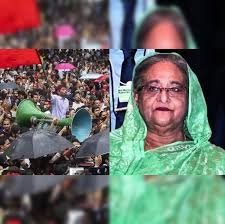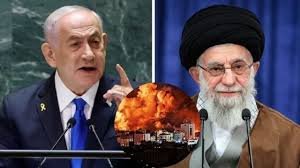
Earthquake in Bangladesh politics: Historic decision to hang Hasina
Shocking order of ICT: Death sentence to Awami League leader
Dhaka, November 17, 2025 (News Agency) ΓÇô A very shocking and historic event was recorded in the political history of Bangladesh today. The International Crimes Tribunal (ICT) of Bangladesh has convicted former Prime Minister and Awami League supremo Sheikh Hasina on charges of crimes against humanity and war crimes and sentenced her to death.
The bench of judges announced this verdict in a hearing held in the court on Monday (November 17, 2025) morning. Sheikh Hasina was not present in the court as she is currently in exile in India, but the case against her has been progressing rapidly for the past few months. The court has held Hasina responsible for alleged anti-humanitarian acts committed during the 1971 liberation war and between 2009 and 2024, for the killings of political opponents and for enforced disappearances.
The court's verdict said, "Sheikh Hasina abused her power and violated the fundamental human rights of thousands of citizens. The government under her leadership committed atrocities against opposition leaders, activists and ordinary citizens. These crimes are unforgivable under international law."
As soon as the verdict was announced, there were mixed reactions in Bangladesh. Supporters of the Awami League took to the streets and accused the verdict of being "political revenge". On the other hand, supporters of the ruling interim government and student organizations celebrated in front of the court. A large number of people gathered at Shahbagh Square in Dhaka and were bursting crackers, chanting "Justice has been served".
Sheikh Hasina had resigned from her post in August 2024 due to the violent nature of the student movement and took refuge in India. After that, an interim government led by Muhammad Yunus was formed in Bangladesh. As soon as the new government was formed, the ICT was reactivated and many cases from the Hasina government were opened and trials were conducted quickly.
Now a big question has arisen about how this sentence will be implemented. Because Sheikh Hasina is currently in India and the Indian government has given her political asylum. The Bangladesh government had already demanded Hasina's extradition, but India has rejected it. Now that the death sentence has been confirmed, it is being expressed that it may have a serious impact on the relations between the two countries.
This verdict has also attracted attention at the international level. Human rights organizations and some Western countries have accused ICT of being "politically motivated", while the verdict is being welcomed in South Asian countries.
Sheikh Hasina's lawyers have said that they will immediately file an appeal against this verdict. They have also claimed that the case is "completely biased and illegal".
This case in Bangladeshi politics has now taken a new turn. This case is certain to be at the center of international justice, politics and diplomacy for the next few days.
Shocking order of ICT: Death sentence to Awami League leader
Dhaka, November 17, 2025 (News Agency) ΓÇô A very shocking and historic event was recorded in the political history of Bangladesh today. The International Crimes Tribunal (ICT) of Bangladesh has convicted former Prime Minister and Awami League supremo Sheikh Hasina on charges of crimes against humanity and war crimes and sentenced her to death.
The bench of judges announced this verdict in a hearing held in the court on Monday (November 17, 2025) morning. Sheikh Hasina was not present in the court as she is currently in exile in India, but the case against her has been progressing rapidly for the past few months. The court has held Hasina responsible for alleged anti-humanitarian acts committed during the 1971 liberation war and between 2009 and 2024, for the killings of political opponents and for enforced disappearances.
The court's verdict said, "Sheikh Hasina abused her power and violated the fundamental human rights of thousands of citizens. The government under her leadership committed atrocities against opposition leaders, activists and ordinary citizens. These crimes are unforgivable under international law."
As soon as the verdict was announced, there were mixed reactions in Bangladesh. Supporters of the Awami League took to the streets and accused the verdict of being "political revenge". On the other hand, supporters of the ruling interim government and student organizations celebrated in front of the court. A large number of people gathered at Shahbagh Square in Dhaka and were bursting crackers, chanting "Justice has been served".
Sheikh Hasina had resigned from her post in August 2024 due to the violent nature of the student movement and took refuge in India. After that, an interim government led by Muhammad Yunus was formed in Bangladesh. As soon as the new government was formed, the ICT was reactivated and many cases from the Hasina government were opened and trials were conducted quickly.
Now a big question has arisen about how this sentence will be implemented. Because Sheikh Hasina is currently in India and the Indian government has given her political asylum. The Bangladesh government had already demanded Hasina's extradition, but India has rejected it. Now that the death sentence has been confirmed, it is being expressed that it may have a serious impact on the relations between the two countries.
This verdict has also attracted attention at the international level. Human rights organizations and some Western countries have accused ICT of being "politically motivated", while the verdict is being welcomed in South Asian countries.
Sheikh Hasina's lawyers have said that they will immediately file an appeal against this verdict. They have also claimed that the case is "completely biased and illegal".
This case in Bangladeshi politics has now taken a new turn. This case is certain to be at the center of international justice, politics and diplomacy for the next few days.
Dhaka, November 17, 2025 (News Agency) ΓÇô A very shocking and historic event was recorded in the political history of Bangladesh today. The International Crimes Tribunal (ICT) of Bangladesh has convicted former Prime Minister and Awami League supremo Sheikh Hasina on charges of crimes against humanity and war crimes and sentenced her to death.
The bench of judges announced this verdict in a hearing held in the court on Monday (November 17, 2025) morning. Sheikh Hasina was not present in the court as she is currently in exile in India, but the case against her has been progressing rapidly for the past few months. The court has held Hasina responsible for alleged anti-humanitarian acts committed during the 1971 liberation war and between 2009 and 2024, for the killings of political opponents and for enforced disappearances.
The court's verdict said, "Sheikh Hasina abused her power and violated the fundamental human rights of thousands of citizens. The government under her leadership committed atrocities against opposition leaders, activists and ordinary citizens. These crimes are unforgivable under international law."
As soon as the verdict was announced, there were mixed reactions in Bangladesh. Supporters of the Awami League took to the streets and accused the verdict of being "political revenge". On the other hand, supporters of the ruling interim government and student organizations celebrated in front of the court. A large number of people gathered at Shahbagh Square in Dhaka and were bursting crackers, chanting "Justice has been served".
Sheikh Hasina had resigned from her post in August 2024 due to the violent nature of the student movement and took refuge in India. After that, an interim government led by Muhammad Yunus was formed in Bangladesh. As soon as the new government was formed, the ICT was reactivated and many cases from the Hasina government were opened and trials were conducted quickly.
Now a big question has arisen about how this sentence will be implemented. Because Sheikh Hasina is currently in India and the Indian government has given her political asylum. The Bangladesh government had already demanded Hasina's extradition, but India has rejected it. Now that the death sentence has been confirmed, it is being expressed that it may have a serious impact on the relations between the two countries.
This verdict has also attracted attention at the international level. Human rights organizations and some Western countries have accused ICT of being "politically motivated", while the verdict is being welcomed in South Asian countries.
Sheikh Hasina's lawyers have said that they will immediately file an appeal against this verdict. They have also claimed that the case is "completely biased and illegal".
This case in Bangladeshi politics has now taken a new turn. This case is certain to be at the center of international justice, politics and diplomacy for the next few days.

.jpg)
















